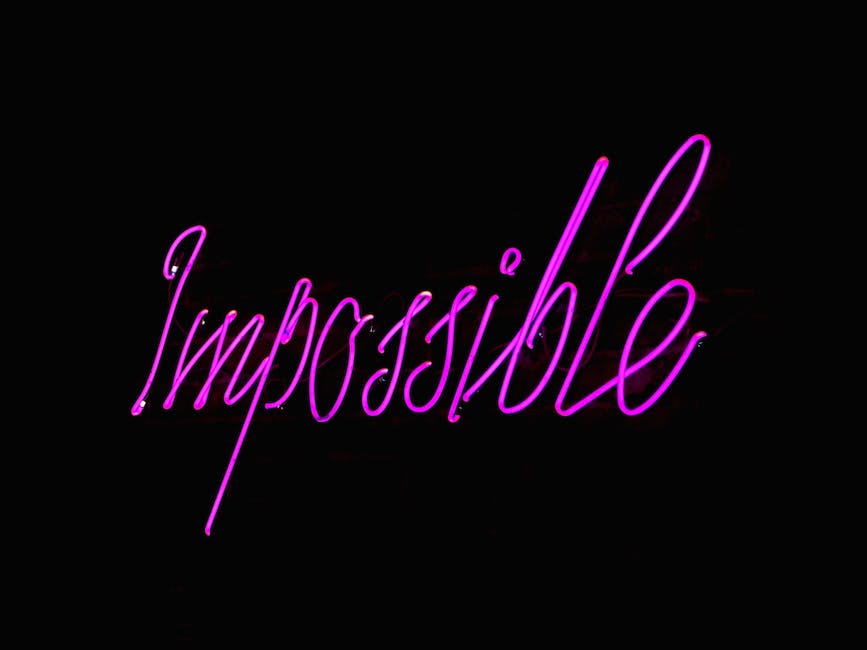Impossible Art: Exploring the Boundaries of Creativity
Impossible Art: Exploring the Boundaries of Creativity
Art has always been a medium through which individuals express their creativity and imagination. It allows us to explore the depths of our minds and push the boundaries of what is considered possible. However, there are certain artworks that defy all expectations and challenge our understanding of what art can be. These are the artworks that can be described as "impossible art."
Impossible art is a term used to describe artworks that seem to defy the laws of physics or challenge our perception of reality. These artworks often leave viewers in awe and wonder, questioning how such creations are even possible. They push the limits of what we believe can be achieved through artistic expression.
One example of impossible art is the work of Dutch artist M.C. Escher. Escher was known for his mind-bending prints that played with perspective and geometry. His famous piece, "Relativity," depicts a world where gravity seems to have no effect, with staircases leading in all directions and people walking upside down. Escher's ability to create such intricate and impossible scenes showcases his mastery of the art form.
Another artist who has explored the realm of impossible art is Salvador Dali. Dali's surrealistic paintings often feature dreamlike landscapes and bizarre imagery. His most famous work, "The Persistence of Memory," depicts melting clocks draped over various objects. This painting challenges our perception of time and reality, creating a sense of unease and fascination.
Impossible art is not limited to traditional mediums such as painting and sculpture. In recent years, digital artists have also embraced the concept and have created stunning pieces that seem to defy the limitations of technology. These artists use computer-generated imagery and virtual reality to create immersive and impossible worlds. One such artist is Refik Anadol, whose work blurs the line between art and technology. His installations use data and algorithms to create mesmerizing visual experiences that challenge our understanding of what is possible in the digital realm.
The creation of impossible art requires a deep understanding of the medium and a willingness to push the boundaries of creativity. It requires artists to think outside the box and challenge conventional norms. It is through this exploration of the impossible that new artistic techniques and styles are born.
However, creating impossible art is not without its challenges. Artists often face technical limitations and the need to find innovative solutions to bring their visions to life. It requires a high level of skill and expertise to create artworks that appear to defy the laws of nature.
Despite these challenges, impossible art continues to captivate audiences and push the boundaries of creativity. It challenges us to question our preconceived notions of what is possible and encourages us to think outside the box. It reminds us that art is not limited by the constraints of reality and that the imagination knows no bounds.
In conclusion, impossible art is a fascinating and awe-inspiring genre that explores the boundaries of creativity. It challenges our perception of reality and pushes the limits of what we believe can be achieved through artistic expression. Whether it is through mind-bending paintings, immersive digital installations, or other mediums, impossible art continues to captivate and inspire audiences worldwide. It reminds us that art has the power to transcend the possible and create something truly extraordinary.
The Unbelievable World of Impossible Art

The Unbelievable World of Impossible Art
Art has always been a medium for expressing the human imagination and creativity. From the earliest cave paintings to the modern masterpieces hanging in prestigious galleries, art has the power to captivate and inspire. However, there is a realm of art that pushes the boundaries of what we believe is possible - the world of impossible art.
Impossible art challenges our perception of reality and forces us to question what is truly possible. It takes us on a journey into the realm of the surreal, where the laws of physics and logic are suspended. This genre of art dares to explore the uncharted territories of the human mind, where dreams and fantasies come to life.
One of the pioneers of impossible art is the renowned Dutch artist, M.C. Escher. His mind-bending works, such as "Relativity" and "Ascending and Descending," defy the laws of gravity and perspective. Escher's intricate drawings and prints create impossible architectural structures and mind-boggling visual illusions. His art challenges our perception of space and leaves us questioning the very nature of reality.
Another artist who has made a significant impact in the world of impossible art is Salvador Dali. His iconic painting, "The Persistence of Memory," with its melting clocks and distorted landscapes, is a testament to his ability to create a world that exists beyond our wildest dreams. Dali's surrealistic style forces us to confront our own subconscious desires and fears, as he blurs the line between reality and fantasy.
The world of impossible art is not limited to traditional mediums such as painting and drawing. In recent years, digital art has emerged as a powerful tool for artists to explore the realm of the impossible. With the advancements in technology, artists can now create immersive and interactive experiences that challenge our perception of reality. Virtual reality installations and augmented reality artworks transport us to alternate dimensions, where the impossible becomes possible.
One such artist who has embraced the possibilities of digital art is Refik Anadol. His groundbreaking installations, such as "Infinity Room" and "Melting Memories," use data and algorithms to create mesmerizing visual experiences. Anadol's work blurs the boundaries between the physical and digital worlds, inviting us to question the nature of our existence in an increasingly interconnected world.
The world of impossible art not only challenges our perception of reality but also serves as a reflection of the human condition. It reminds us that our imagination knows no bounds and that we have the power to create worlds that defy logic and reason. Impossible art encourages us to think outside the box, to question the status quo, and to embrace the limitless possibilities of the human mind.
In a world that often feels constrained by rules and limitations, impossible art offers us an escape into a realm where anything is possible. It invites us to suspend our disbelief and embrace the fantastical. Through impossible art, we are reminded of the power of imagination and the importance of pushing the boundaries of what we believe is possible.
In conclusion, the world of impossible art is a testament to the boundless creativity and imagination of the human mind. It challenges our perception of reality and invites us to explore the uncharted territories of the impossible. From the mind-bending works of M.C. Escher to the surrealistic paintings of Salvador Dali, impossible art pushes the boundaries of what we believe is possible. Whether through traditional mediums or digital installations, impossible art serves as a reminder that our imagination knows no bounds. So, let us embrace the unbelievable world of impossible art and allow ourselves to be transported to a realm where the impossible becomes possible.
Pushing the Limits: The Fascinating Realm of Impossible Art
Pushing the Limits: The Fascinating Realm of Impossible Art
Art has always been a medium through which individuals express their creativity, emotions, and perspectives. It allows artists to push the boundaries of what is considered possible, creating works that challenge our perceptions and ignite our imagination. In the realm of impossible art, artists take this concept to a whole new level, creating mind-bending and awe-inspiring pieces that seem to defy the laws of physics and logic.
Impossible art is not limited to a specific medium or style. It encompasses a wide range of artistic expressions, from paintings and sculptures to installations and digital art. What sets it apart is the artist's ability to create something that appears impossible or highly improbable, leaving viewers in a state of wonder and disbelief.
One of the most famous examples of impossible art is the work of Dutch artist M.C. Escher. His intricate and mind-boggling drawings, such as "Relativity" and "Ascending and Descending," challenge our perception of space and gravity. Escher's ability to create impossible architectural structures and impossible objects leaves viewers questioning the very nature of reality.
Another artist who has pushed the limits of what is possible is Salvador Dali. His surrealist paintings, such as "The Persistence of Memory," depict dreamlike landscapes and distorted figures that defy the laws of physics. Dali's ability to create a sense of unease and confusion through his art is a testament to his mastery of the impossible.
In recent years, digital art has opened up new possibilities for artists to explore the realm of the impossible. Through the use of computer-generated imagery and advanced editing techniques, artists can create hyper-realistic and fantastical scenes that would be impossible to capture with traditional mediums. This has led to the emergence of a new wave of impossible art, where artists can manipulate reality in ways that were previously unimaginable.
One such artist is Alexey Zakharov, who gained recognition for his stunning video titled "The Old New World." Using a combination of historical photographs and 3D modeling, Zakharov created a virtual tour of New York City in the 1930s. The level of detail and realism in his work is truly remarkable, blurring the line between what is real and what is impossible.
The realm of impossible art not only challenges our perception of reality but also encourages us to think outside the box and question the limitations we impose on ourselves. It reminds us that there are infinite possibilities waiting to be explored and that creativity knows no bounds.
However, creating impossible art is not without its challenges. Artists must possess a deep understanding of their chosen medium and a keen eye for detail. They must also have the technical skills and knowledge to manipulate their materials or tools in unconventional ways. It requires a level of dedication, patience, and perseverance that not every artist possesses.
In conclusion, the realm of impossible art is a fascinating and awe-inspiring world where artists push the limits of what is considered possible. Through their creativity and mastery of their chosen medium, they create works that challenge our perceptions and ignite our imagination. Whether it is through mind-bending drawings, surreal paintings, or hyper-realistic digital art, impossible art leaves viewers in a state of wonder and disbelief. It reminds us that there are no limits to what can be achieved through creativity and that the impossible is only a concept waiting to be shattered.
- Ini Smartphone Samsung Harga 1 jutaan - October 29, 2025
- Harga Samsung Galaxy Android Murah di Bawah 1 Juta 2016 - October 29, 2025
- Menilik Perbandingan Kualitas Spesifikasi Hp Samsung dengan Harga nya - October 29, 2025





